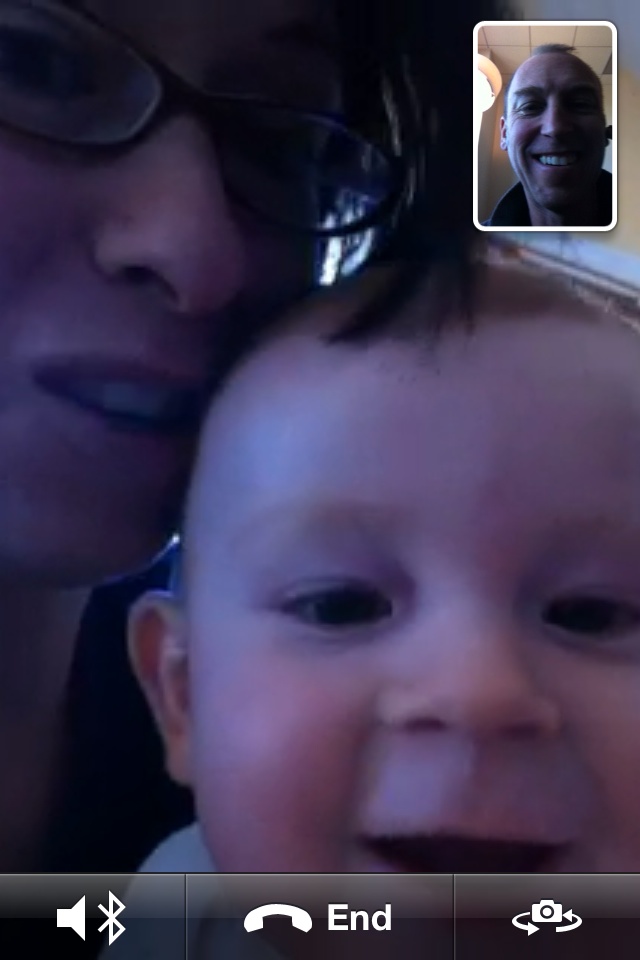Advertisement
Do Babies Understand FaceTime And Skype?
ResumeVideo chatting on Skype or FaceTime with a baby is an adorable idea, and reassuring for parents and grandparents far away from their little loved ones, but what do the babies and toddlers get out of it? Do they understand what's happening?
Dr. Michael Rich, who heads the Center on Media and Child Health in Boston, tells Here & Now's Jeremy Hobson that young children connect to voices and other audio cues first.
He says it's unclear though whether they can emotionally understand why they're seeing someone they love on a screen but can't touch them.
Do you keep in touch with a child by video chatting? What has the experience been like? Tell us on Facebook or in the comments.
Interview Highlights: Michael Rich

At what age do babies understand what is happening during a FaceTime call?
“Our concept of understanding and what babies understand is different. In other words, there’s not a switch that’s thrown where they have complete understanding. They are able to recognize voices, recognize patterns. The question really becomes when they are able to decode that pattern of light and darkness on a two-dimensional screen as grandma’s face or whatever. The voice comes before the image does.”
On the appeal to grandparents to see their grandchildren despite long distances.
“One of the things I think is really important is for the grandparents to establish themselves as real, three-dimensional, living and breathing people before they start the video chatting because otherwise they’re just an image on the screen. So they’re the same as Fred Rogers or Elmo.”
Should people be worried about spending too much time Skyping or FaceTiming, as they do with watching too much television?
“I honestly think the concept of screen time is obsolete. We developed that concept when it was only television, and when that meant sitting passively on the couch, the proverbial ‘couch potato,’ just absorbing stuff. We now have such a wide variety of screen media devices that do certain things very well, but don’t do everything well.”
Does it change our emotional connections?
“Absolutely. Of course. It’s much safer. You have much less fear of intimacy or the risks inherent in intimacy if you are separated by a screen, and that’s why people will go on Facebook rather than pick up the phone or call someone.”
Is that something that matters to babies?
“Absolutely, I mean little kids are sensual beings. It’s all about the senses. Everything goes in their mouth; they taste it, they smell it, they touch it and this is a very sterile sensuous environment. It’s not like having mommy and I think that’s what freaked my son out. Mommy’s voice was there, it looked like mommy, but it wasn’t mommy’s warmth, it wasn’t mommy’s smell, it wasn’t mommy’s holding of him.”
What would you suggest regarding use of this technology with infants?
“Use them when grandma is now 600 miles away and you’re not going to see her for a while, and don’t make it seem more than it is or less than it is, it is just a way of connecting. Even if grandma is using words they don’t understand, they see what her hands are doing and they see where her eyes are.”
Do dogs understand FaceTime?
“My dog does. In fact, I just got back from Arizona and my dog was crying, he’s still a puppy, and he was crying to go to sleep and my wife FaceTimed me up and put me on. I don’t know if the visual did it, I think it was my voice. I think they’re much more sensitized to the voice. We also know that their optical system develops slowly, but it’s also not just getting the signal to the brain, it’s also interpreting that signal in the brain."
Guest
- Michael Rich, M.D., founder and director of the Center on Media and Child Health. He's also an associate professor at Harvard Medical School and the Harvard School of Public Health, and practices adolescent medicine at Boston Children’s Hospital.
This segment aired on February 4, 2016.